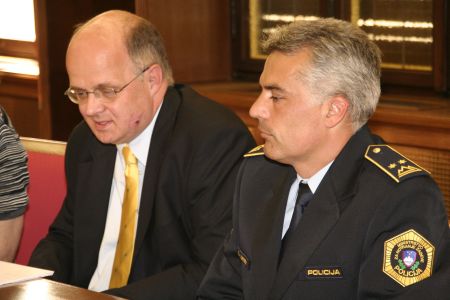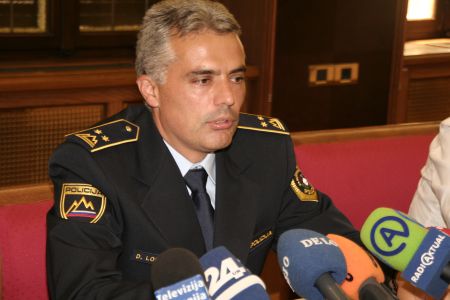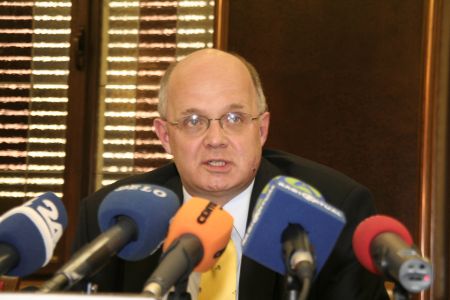"Provision of security and protection of law and order at the matches and other events during the European Football Cup EURO 2008, to take place in June in Austria and Switzerland, will be a big challenge for the police services in the hosting countries and the countries taking part in the matches, as well as in the adjacent countries" - this was the opinion shared by representatives of both police services at today's joint press conference at the General Police Directorate, the purpose of which was to present activities and measures taken by the Austrian and Slovenian police to provide security for EURO 2008.
According to Danijel Lorbek, head of the Border Police Division within the Uniformed Police Directorate of the Slovenian General Police Directorate, and Berndt Körner, head of the Aliens and Border Police Division at the Federal Ministry of the Interior in Austria, all activities have already been planned and they are well prepared for the event.

According to Mr Lorbek, by signing the joint declaration with Austria, Slovenia made a commitment to take measures and actions to ensure security during the matches, as well as the well-being of the spectators and visitors of Euro 2008: "Actions and measures taken by the Slovenian Police will aim at providing security and law and order, and at preventing any riots and unlawful conduct of fans and visitors of Euro 2008 in Slovenia; they will be based on the assumption that the cup will be mostly attended by bona fide fans and spectators, who should be ensured fast transit and achievement of the objectives of their trip."

"At the border crossings on the external border, the Slovenian Police will perform systematic spot checks in accordance with the provisions of the Schengen Borders Code," stressed Mr Lorbek. Third-country nationals will undergo a thorough border control, including verification of their identity both in the national records and in the Schengen Information System. This will also apply to third-country nationals for which entry visas are required (e.g. from Turkey), as well as special visas bearing the inscription Euro 2008, which are issued by Austria and Switzerland for visitors of the cup. The Slovenian Police will also take account of the fact that Croatian nationals may enter Austria and Switzerland only with a passport; consequently, they may not enter Slovenia with an identity card if they are in transit as spectators of the cup. Vehicles and luggage of fans will be subject to rigorous checks. Persons possessing articles which might endanger law and order and internal security (e.g. articles which might be used in fan clashes, pyrotechnic products) will be denied entry.
During the cup, at the external borders the joint operation Eurocup 2008 will take place, which will be managed and coordinated by Frontex (the European Agency for the Management of Operational Cooperation at the External Borders of the Member States of the European Union). At the focal points of the border crossings Gruškovje, Obrežje, Dobova, Jelšane and Starod, an increased number of Austrian and other police officers from abroad will be present. They will have the task to intensify the exchange of information and to assist in carrying out border checks, with special emphasis on verifying possible visa abuses and finding forged documents, combating organised crime and preventing illegal immigration.
"We expect that mostly Croatian fans will transit Slovenia, but also a smaller number of fans from Romania, Greece and Turkey," said Mr Lorbek; he added, "Therefore, in order to ensure security and to prevent violations of law and order, the police will increase the presence of officers on all the routes where unlawful conduct of individuals or groups is expected. The police will supervise compliance with regulations on law and order at motorway rest stops, filling stations and in other places where fans may be expected to gather, particularly in the case of larger organised groups. Police officers will perform all these tasks in addition to their regular work, and we will also deploy a number of additional police officers and mobilise members of a special police unit."
In accordance with the provisions of the Schengen Borders Code, from 2 June (00.00 hours) to 1 July 2008 (24.00 hours), Austria will restore state border supervision at its internal land, air and water borders. Pursuant to the provisions of the Schengen Borders Code, Austria has notified all Member States of this measure, including Slovenia. Consequently, Austrian police will restore border supervision at some border crossings on the border with Slovenia and, in accordance with bilateral agreements signed between Austria and Slovenia, where required in individual cases they will also exercise supervision over zones on the territory of Slovenia, as was the practice before Slovenia joined the Schengen area.

At the press conference, the representative of the Austrian Police, Mr Berndt Körner, explained in more detail the reasons why Austria decided to introduce such measures. "Article 23 of the Schengen Borders Code lays down that in certain situations every Member State may reintroduce border control. This is certainly a big challenge to the state deciding to take such a measure. In accordance with the Schengen Borders Code, Austria notified the EU Council, European Commission, European Parliament, all the ministers of the Member States and all ministers of the interior in the countries participating in the European Football Cup of this measure."
"Such an action is certainly only one part of a wider concept or a wider package of safety measures," emphasised Körner. "It is not only the reinstatement of border controls that should contribute to greater safety and security. The aforementioned Article 23 lays down that this border control must be proportional, which means it should be performed only to such a degree that safety is ensured. Therefore, a lot of activities had to be carried out during the preliminary preparations. For example, experts in forged documents were sent to embassies, and almost fifty police officers were sent to the external border focal points to help. Further, two liaison officers were appointed at the Frontex agency and in Switzerland so that undisturbed communication can take place 24 hours a day. We also sent our police officers to smaller regional airports in the neighbouring countries. Additionally, various countries, neighbouring countries and participating countries seconded 135 police officers via Frontex, who will help their Austrian colleagues in ensuring public law and order inside Austria. All these measures were initiated at embassies and include the last border crossing where transit is expected. Border control represents only one part of this overall concept of ensuring security and safety during the championship."
"In connection with the introduction of border controls, it is necessary to add that such a measure is in fact a unilateral one-sided act, where the neighbouring country need not carry out border control. In this case we will try to ensure that only minimum control shall be carried out for tourists and people for whom it is clear that they are going on holiday. In this way, it will be easier to "concentrate" on risky persons. In some places stationary, and occasionally mobile, controls checking identity documents will be set up. For safety reasons only, I will certainly not tell you where and when exactly the police officers will carry out these controls. However, if we look at the topographic map of the common border, it should be clear where this will be happening. I hope that this way of "filtering" will ensure a high level of safety. After all, it is the European championship, our joint European project, and we, with joint forces, will try to ensure the safety and security of this event."
Immediately before the European championship takes place and during the championship, Austria and Switzerland will activate a special Police Information and Coordination Centre (PICC), where operational data for the needs of police work will be collected. Slovenia as a neighbouring and transit country for the European championship participants will designate one liaison officer to assist the Austrian PICC. The purpose of this kind of cooperation is high-quality exchange of data without surplus intervention. The role of the liaison officer will include accompanying, checking, confirming and disseminating data necessary for the proper preparation and work of operational units in Austria and Switzerland, as well as in Slovenia, involved in fans travelling to the European championship and their return. The exchange of information will take place through the three-letter centre for police cooperation between Austria, Italy and Slovenia in the police centre Vrata-Megvarje. Information on the travel of fans will be transferred to the Slovenian Police by the Croatian Police, via Interpol and by direct exchange of information via operational communication centres and border crossings.
"Based on the facts stated earlier, it is clear that before, during and after the European championship, intensive cooperation will take place between various services within the Slovenian Police and the police forces of neighbouring countries, as well as the Frontex agency, which will carry out a joint operation during the event on the entire external border with a view to ensuring appropriate safety and security of people and property during the European championship," concluded Mr Lorbek. The representative of the Austrian Police thanked Slovenia for its intensive and good cooperation during the preliminary preparations, which made implementation of all the measures described even smoother.

